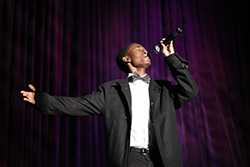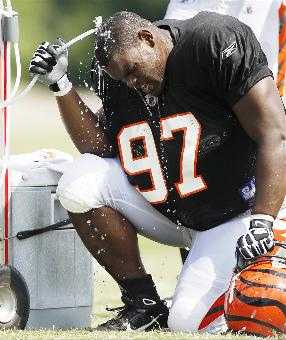Real Stories from People Living with Sickle Cell Disease
On this Page
The Green Family Story
“When AJ was born in 1992, there was a real lack of information and education about newborn screening and sickle cell disease. They just told us he was having a PKU shot and then the doctor actually called on the telephone and gave us his results. It wasn’t really something back then that they talked about. They just said that he has to have a PKU shot. We didn’t know then that it was newborn screening. The doctor told us that the newborn screening showed that AJ has sickle cell disease. I have the sickle cell trait and my husband has the trait. I didn’t really know anything about, or anybody with, the actual disease. But when the doctor said the word ‘disease’ I started crying because I knew that couldn’t be good. At that time, of course, I was devastated. I went to the computer and looked it up and saw what could happen to him and what was down the line for him.

“AJ had his first sickle cell crisis at about 8 months. We didn’t really know what to expect with a crisis, but the early newborn screening test was helpful because we knew he had sickle cell disease. When he had his first painful sickle cell crisis we would never have known to take him to the hospital. We probably would have just thought he was crying to be crying and put a bottle in his mouth. We knew something had to be wrong with him and we didn’t take it lightly. We took him to the hospital and they said that he was having a crisis in the top of his foot. It was important to have the newborn screening done so that we knew to watch for these things. If we hadn’t had the newborn screening done we wouldn’t have known what was going on with him and sought appropriate care right away.
“It’s important for parents to get newborn screening to know if there’s anything wrong with the child. If it’s sickle cell, it just makes you aware of what’s going on with the child, things to look for (if they’re dehydrated, not getting enough water, if they’re crying a lot from pain) because you don’t know that they’re hurting, they can’t tell you.” – Pam Green
AJ, at 19 years old, an accomplished singer and sickle cell disease advocate, has accomplished more than most teens his age and doesn’t let his condition keep him from reaching his goals. In addition to performing for two U.S. presidents, Clinton and Obama, the Grammy-hopeful has shared the stage with Elton John, the Canadian Tenors, Jason Mraz, Rob Thomas, and sang a duet with Jennifer Hudson. He continues to be a strong advocate for the community in his efforts to “put sickle cell on the map” by raising awareness of the condition so that someday it will receive as much attention as other high profile disease states such as cancer. He recently spoke with the kids at the Sickle Cell Disease Association of Mobile, Alabama and joined up with Remington College’s “3 Lives” blood drive campaign which raises awareness for minority blood donors and encourages people to donate blood.
“For the most part I have been able to meet all my goals, but I always strive for bigger goals in life so everything’s not complete just yet. My first aspiration was to be known as a singer and also as an advocate for sickle cell disease. I try to be that inspiration, you know. It’s not as bad as people try to make it seem. I mean, it is, but it’s not. People don’t have to be afraid of it; they don’t have to be held down by it. Try to find triumph in the situation.” – AJ Green
CDC would like to thank AJ and Pam for sharing this personal story.
Geno Atkins’ Story

“My story started when a young man met a young lady on the campus of Florida A&M University. On their first date he asked the young woman if she carried the sickle cell trait! That young man became my dad and the young lady is my mother. My dad carries the sickle cell trait and was well aware that if he married someone who also carries the trait, their kids had a 50% chance of being born with full blown sickle cell disease. He discovered that my mother is not a carrier of the sickle cell trait. The rest is history.
“I am the oldest of three children and the only one with sickle cell trait. The first time I learned I carry the sickle cell trait was as a freshman at the University of Georgia. I called home and my mother said, “Your dad has the trait, but I don’t recall the doctor saying you had the trait when you were born.” All newborns are tested for the trait in Florida, yet I had gone my whole life without knowing.
“Once I learned I had the trait I researched as much as I could and talked with the football training staff. They assured me that the trait would not affect my ability to play. There were four freshmen who tested positive for the trait along with me and we were assigned a trainer who watched us closely during practice sessions and on game day. I was not treated differently by my teammates and went about my life just as I had before. One day I learned that a football player had died from complications of sickle cell trait while participating in spring practice at another university. That’s when I realized that this is a serious issue and I should not take any chances with my health. I played at the highest level in college and it earned me a spot in the NFL.
“I knew from my research that it would not be good for me to play in high altitude, so I prayed I wouldn’t get drafted by Denver, which is at a high altitude. I ended up in Cincinnati and have played at a very high level without any adverse affects of the sickle cell trait. During the 2011 season we did travel to Denver to play the Broncos and that was the first time I can truly say I felt the effects of the trait. I could not breathe after a 10-play series and had to be given oxygen on the sideline.
“Some of the changes I’ve made in my life include eating healthy, avoiding drugs and alcohol, not smoking, and most importantly getting a lot of rest. Everyone in my family knows that I have to take my daily nap. I drink more water, sports drinks, and coconut water than ever before because it is important to stay well hydrated before and after activities.
“Having the sickle cell trait does not exclude an athlete from participating in sports, however, the training staff and coaches need to take precautions to ensure the athlete is not put in dangerous situations. In high school my coaches would get on me because I was always in the back during running drills and I often got very tired. I think back now and realize that it could have been a dangerous situation for me if over-zealous coaches or I had pushed too much during those hot days in south Florida.
“Each year I am saddened to learn of another young athlete dying from complications of the trait while participating in sports. This vicious cycle lets me know that not enough information, education, and spotlight are given to this issue. My goal is to start a foundation, with the primary focus on offering testing for athletes at the high school level and getting education for trainers and coaches on how to help the athletes be the best they can be.”
CDC would like to thank Geno Atkins for sharing his personal story.
If you would like to share your personal story, please contact us at Contact CDC-INFO
- Page last reviewed: August 31, 2016
- Page last updated: December 28, 2015
- Content source:


 ShareCompartir
ShareCompartir